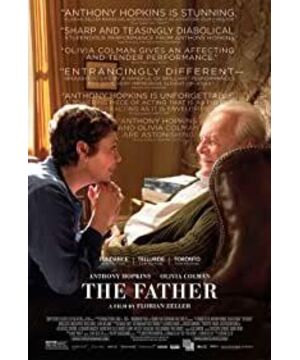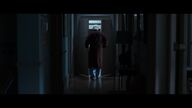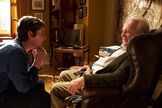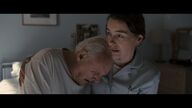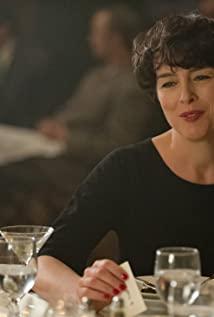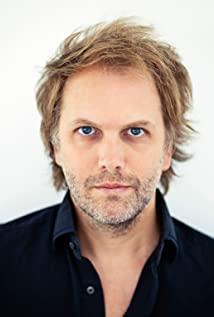In the first act of the movie, the daughter played by Olivia Coleman came to visit the father played by Anthony Hopkins. In this unremarkable opening, what is more unusual is that it is always accompanied by a seemingly passive symphony. As he entered his father's apartment, his father took off the headphones that were playing the symphony, and the "passive" soundtrack came to an abrupt end, and the ambient sound regained its dominance.
After this slightly unusual audio-visual processing with unsynchronized sound and picture, the movie then enters a more puzzling plot. The daughter came to visit the father because the father was angry and the daughter was looking for the third caregiver girl to take care of the elderly father, and stated that because of the reason to move to Paris, if the father refused the care of the caregiver, she could only be sent to Nursing home. Immediately after presenting the subjective lens of the father watching his daughter leave, the movie was followed by a number of indoor empty mirrors that clearly did not see the time mark. A son-in-law who claimed to be her daughter’s husband politely and directly "breaked in" The father’s apartment, claiming that this apartment actually belongs to him, and asking the father to move out as soon as possible, and the daughter returned from shopping outside, the father found that the "daughter" at this time is no longer the previous daughter, but took over the ingredients purchased by the daughter The son-in-law turned around and disappeared inexplicably. After asking the "daughter", the "daughter" said that he had never been married. How could he be a husband? Then, the movie once again presented a shot from the subjective perspective of the father, and after a few sets of empty shots without time-marking prompts, the daughter played by Olivia Coleman returned from shopping. At this time, the blue shopping bag on the table It coincides with the shopping bags on the table behind the previous series of empty mirrors.
I believe that after reading the narrative that I try to maintain logic, or directly watching the two plots of the movie, you will have a sense of unreliable confusion that is either very clear or very vague, but you can see some vague and richness in it. Logical factual fragments. And in the next whole movie, until the end, this kind of always accompanying feeling and the patchwork of gradually increasing fragments will gradually form the whole story. Some of these questions will be answered clearly and definitely, such as: Where was the father last? Did the daughter go to Paris?
When we look back at the gradual production process of answers, from the perspective of narrative results, we can be sure that confusion is obviously not the cause of certainty, but the whole may be the result of the accumulation of fragments.
So, starting from the special sound and picture separation process at the beginning of the movie, the music in the headphones of the absent father actually appeared directly in the environment, to reveal the appearance of this seemingly "passive" active sound Perhaps it can’t be regarded as a drama of a pure and objective daughter visiting her father, but should be regarded as the father’s subjective stream of consciousness narrative. In this perspective, the sound source is unusually “deceived” by visual confirmation. In order to reflect its rationality, perhaps the daughter's visit to the father is just a memory of the old scene in the father's mind. Then, based on the subjective stream of consciousness narrative that laid the foundation at the beginning of the chapter, the strenuous sense of confusion stated above is also endorsed by the former (subjective stream of consciousness narrative), and thus the overall inconsistency is presented. The narrative picture of a reliable narrative.
Behind this picture, it is undoubtedly heartbreaking to find the cause, because such an unreliable narrative can ultimately be attributed to the fact that the father may be suffering from Alzheimer disease (Alzheimer disease, AD), and is gradually losing Wisdom leads to the fact that his subjective consciousness is abnormally confused. But even with such a solid factual basis, it cannot explain the reasons for the many logical fragments and the final deterministic answer. The purpose of those plots has been past, and in the end, it is so vivid and sensible. They are pieced together. It's a story: the father is unable to take care of himself because of his advanced age and is gradually demented, and his daughter is desperate because of the lack of love for so many years and the blessing, a stubborn and proud father who has lost his youngest daughter, no Willing to move away from the old apartment and do not want people to take care of the land and "kidnap" his daughter; a man who can't leave his father but has his own life, is experiencing the double torture of the dearest and the beloved, but has to make the decision to send his father to the nursing home The story of his daughter.
In such a story, the past is felt bit by bit at this time, and the linear history is all melted into the complicated present. Only here is the dimension of the narrative structure truly clear: it is a period of sharing with my daughter, Unforgettable diachronic memories flood into the present where the father may have been the synchronic chaotic thoughts that come back on the eve of dementia , the unreliable narrative symbolizes the confusion of the mind but the certainty of the story, and the fragments of the past are flooding. It constitutes the real picture of life now, and the appearance of Alzheimer's disease is not amnesia, but the gradual loss of life order. Perhaps only in this dimension, the joy of those actually happened, Yan smile, happy, quarrels, helpless, sad only in this time period of the past occurred in synchronic time now under mutually entangled in the mesh of narrative, Let the viewer truly empathize.
So far, looking back at the entire linguistic level of indoor scheduling and obstinate indoor play may have more meaning. It is not difficult to find that the subjective perspective of those fathers who look out the window corresponds to the closed room, which may symbolize The inability to escape is also the last surviving reason and memory that the father has been reluctant to escape. It is the last resistance of the father to the natural state of the lonely and self-loving modern man. Just as Dreyer’s pursuit can be traced back from this: the fifth dimension of the soul. What the viewer can see, fades the complexity and directly hits the subtle appearance of people under complex mental activities, as if it can respond to Deleuze's talk about Deleier's absolute off-site that cannot be photographed, one belongs only to his father. Five degrees of space.
****
I once again lament the unparalleled, wonderful and moving acting skills of Sir Anthony Hopkins.
View more about The Father reviews


